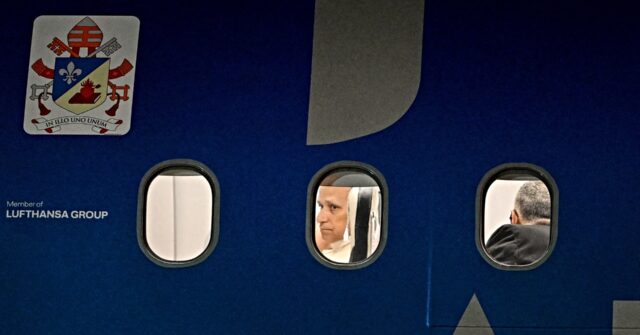Both nations have robust Muslim populations today but played critical roles in the early development of the Church. Over 30 percent of Lebanon remains Christian, the majority of that population Catholic, and its constitution requires the president of the country to be a Maronite Christian. Turkey – after the collapse of the Byzantine Empire, the imposition of secularism under founder Mustafa Kemal Atatürk, and the return of Islamism under President Recep Tayyip Erdogan – is a less welcoming country to Christians, though Erdogan is expected to meet with the pope personally.
The pope made his request for prayers during his regular General Audience on Wednesday, the last before he departs for Turkey.
“It will be an occasion to commemorate the 1,700th anniversary of the Council of Nicaea and to encounter the Catholic community, our Christian brothers and sisters, and members of other religions,” the pope observed.
The Council of Nicaea was the first global assembly of Christian leaders following the death of Jesus Christ, taking place in the eponymous city in what is now Turkey in 325 AD. The Council, organized by Emperor Constantine the Great, was intended to address growing arguments among Christian clergy regarding the details of the faith, including whether Jesus was equal to God and as eternal. The event, an unprecedented one in Christian history at the time, allowed the clergy to produce a uniform declaration of faith, the Nicaean Creed, that Catholics still recite as a profession of faith today.
As the Council occurred prior to the Great Schism that split Rome from the Orthodox Church in Constantinople, the event is of great significance to both churches. Pope Leo published a letter on November 23 addressing the importance of the anniversary and calling for greater unity between the Catholic and Orthodox churches.
“It is true that full visible unity with the Orthodox and Oriental Orthodox Churches and with the ecclesial communities born of the Reformation has not yet been reached,” Pope Leo observed. “Nevertheless, ecumenical dialogue, founded on one baptism and the Nicene-Constantinopolitan Creed, has led us to recognize the members of other Churches and ecclesial communities as our brothers and sisters in Jesus Christ, and to rediscover the one universal community of Christ’s disciples throughout the world.”
“Truly, what unites us is much greater than what divides us!” he continued. “In a world that is divided and torn apart by many conflicts, the one universal Christian community can be a sign of peace and an instrument of reconciliation, playing a decisive role in the global commitment to peace.”
“In order to carry out this ministry credibly, we must walk together to reach unity and reconciliation among all Christians. The Nicene Creed can be the basis and reference point for this journey,” the pontiff suggested.
While the former Byzantine empire fell to Ottoman Muslim rule in 1453, and the current government of Turkey under strongman Recep Tayyip Erdogan is Islamist and persecutes Christians, the Turkish government is welcoming the papal visit and Erdogan is personally expected to hold a meeting with Pope Leo. The Turkish state news outlet Anadolu Agency reported, citing Erdogan’s office, that Pope Leo will remain in Turkey for three days and discuss “bilateral relations between Türkiye and the Vatican as well as current regional and global developments, particularly the situation in Palestine” with the president.
Elsewhere on his tour of Turkey, Pope Leo will visit the Sultan Ahmed Mosque, also known as the Blue Mosque, in Istanbul, and meet with the Ecumenical Patriarch of Constantinople, Bartholomew I. He will also hold a Mass before his departure.
Following his visit to Turkey, Pope Leo will be in Lebanon from November 30 to December 2. According to his schedule, the pope will meet with several Christian communities throughout the country, visit a hospital, and pray at the site of the 2020 Beirut port blast, which killed over 200 people.
His visit comes at a volatile time for the country, whose government is attempting to contain the influence of the jihadist terror organization Hezbollah but facing growing Israel strikes in the south of the country as well, the latter also allegedly an operation against Hezbollah. Israeli Defense Minister Israel Katz further threatened Lebanon on Wednesday, declaring that the country would “intervene with force” if Hezbollah was not fully disarmed by the end of the year.
“There will be no calm in Beirut nor order and stability in Lebanon as long as the security of the State of Israel is not guaranteed,” Katz proclaimed.
Asked about the situation in Lebanon on Wednesday, Pope Leo called Israel’s attacks in southern Lebanon a “very great cause for concern” and called for all parties “to abandon the use of arms to resolve problems.”
Pope Leo will hold a Mass on the waterfront of Beirut on December 2, expected to be attended by over 100,000 people.
Follow Frances Martel on Facebook and Twitter.
Breitbart News
Read the full article .


